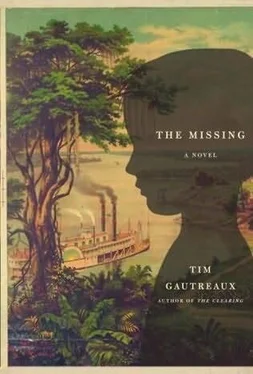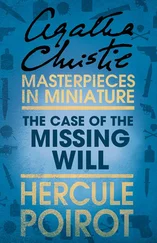“I haven’t seen her again. I go to work tomorrow, and I guess she’ll be on board.” Sam stood and shook his pants legs loose. “They trying those people in Kentucky?”
The lawyer, who wore a thin mustache, turned it up on one side. “Well, I don’t know. The jurisdiction’s rather confused.”
“I figured they’d get out of it.”
“Oh, I wouldn’t say that. They’re still in a county jail in Mississippi. The sheriff there’s got his own juice, as they say, and the Whites threatened him in several ways, then offered to bribe him, so there are two or three new local charges against them. Mrs. White’s in the regional female prison wearing denim clothes along with the whores and lady pickpockets. Not doing too well, I hear. Mr. White’s still in the Woodgulch pokey.”
Sam thought about this while the lawyer examined his handwriting. “I guess it might bother them more than it would some other folks.”
“Let’s just say they’re not used to such accommodations. I got a telegram from Graysoner, Kentucky, that said the local paper has the story all over the front page, and the reporter didn’t gild the lily, if you know what I mean.”
“I’d have guessed the local paper would’ve taken their side.”
“Me too. But the reporter has a young brother on the police force who gave him some interesting details.”
Sam grinned. “Sometimes a criminal gets his justice just because of bad luck?”
The lawyer opened the door into the marble hallway. Down the broad stairs Sam heard people talking and quick footsteps, and someone dropped what sounded like an armload of file folders. Throughout the building people were trying to propel the lumbering steamroller of justice forward in a straight line, but it seemed to him a complex business, both noble and imprecise.
The lawyer clapped a hand on Sam’s shoulder. “As for bad luck, I think the Whites have rolled snake eyes.”
***
THE AMBASSADOR ran three trips on a Saturday in New Orleans, breaking in the new band, the repaired machinery, and a revolutionary speaker system mounted on the roof and dance floor. On Sunday, Sam went to Mass at the cathedral with his wife, and at noon the boat departed, banners flying, bunting set, and twin clouds of coal smoke rising skyward. It would run a meet-the-boat trip, carrying excursionists upriver about forty miles and then exchanging the whole crowd with that from the Buckeye Deluxe, a big sidewheel excursion boat tramping south. The Ambassador would then paddle upriver to Donaldsonville and drop off the sidewheeler’s tired load.
Sam caught a glimpse of Elsie through the crowd boiling around the decks, but the captain caught his arm as he was making his way to her.
“Lucky, we’ve got a new generator in the engine room, and Bit says he can’t watch it all the time, so you’re elected to learn how to operate the thing and just check its meters every couple hours. It runs all the new bulbs on the rails, plus the loudspeaker thing.”
He made a face. “A generator?”
“Go on. It’s not like learning piano, for gosh sake.”
He went down to the engine room and sat amid the hissing machines and worried through the manual, testing the circuits and learning the Bakelite control board and its tangle of fuses, rotary controls, and knife-blade switches. It was impossible to learn the manual because all he could think of was Lily and her mother. He gave up and walked forward to the main deck. After the boats tied up side by side and exchanged passengers, the purser discovered that the Deluxe had overbooked, and excursionists were stacked on the Ambassador ’s forecastle trying to get up to the good music. The deck speakers were meant for colorful commentary on things the boat passed by, but the captain found Sam and directed him to figure how to connect the stage microphones to the on-deck speakers so he could forestall a riot. The Donaldsonville crowd had been floating south all morning listening to a dull hotel orchestra while sipping radiator-made shine and were primed to try the hot tempos of this New Orleans band. An hour upriver Sam figured out the crossovers, and people began to dance up on the hurricane deck and in the lower lounge. He walked up to the Texas roof and looked down on hundreds of dancers, feeling the thin lumber of the old boat rumble under him like a wooden bridge bearing a cattle drive. When he turned to look aft, Elsie was standing next to him, her little waitress crown sunken down into her sweaty hair.
“I’ve been looking for you,” she said. “The crowd’s going to bunch into the café in a minute, so they sent me out on a break. It’s been a crazy house since noon. I was almost killed over a ham sandwich.”
She had aged two or three years in the few days since he’d seen her, her face flushed and shiny with both labor and grease from the kitchen ranges. “How’s Lily doing?”
She gave him a look. “Not so damned well. She asks me for baby dolls every hour on the hour.” She turned and watched the darkening river as if she might jump into it. “I don’t think she understands where and what she’s come back to.” She pulled out a pack of cigarettes and lit one with Ted’s military lighter. “The other night we were eating in the back of the café and she asked me for roast duck.” Her eyes grew wide, incredulous. “What kind of little girl did you bring back to me? She thinks she’s a rich kid.”
“Give her some time to fall back into your routine. She’ll come around.”
“I don’t know. I tried to spend some time with her by teaching her a new song, ‘Ma, He’s Makin’ Eyes at Me’? She said it was nasty.” Her voice rose. “She said her mother was teaching her a nasty song.”
Sam thought of the White’s many-roomed house, its manicured hill, guessed at what those people had taught her. “She’ll get used to things.” As he said this he knew he didn’t believe it.
“She’s just a baby. She’s been gone from me for ten months. That’s a big part of a baby’s life.”
They talked until Mrs. Benton called down to them from the pilothouse. “I’m fixing to blow for a descending tow, so unless you enjoy getting splashed with hot condensate I reckon you ought to move.”
***
THEY RAN three trips at Natchez against a competing boat come down from Davenport and did well. Jazz was still rare along the river, so the sports, the young people, the heartstrong dancers-whether swells or hillbillies, sawmill bucks or plantation beauties-came down the bluffs at late dusk to board the light-lavished steamer and glide out into the dark, taking on the breeze and moving their feet, or rather, having their feet moved by this strange, powerful sound come up from New Orleans against the currents.
Sam watched Lily as much as he could, talked to her as much as she’d allow. She seemed a closed vessel, not showing who she was, perhaps not even knowing, not anymore. At rehearsal, when she sang a novelty number her mother had taught her, her voice lacked energy and rhythm. She remembered the words, but seemed to have forgotten how to form or phrase them. The intelligence of her voice had been robbed away. What had stolen it, Sam couldn’t guess, at least not at first. Then one night, lying in his bunk above a snoring Charlie Duggs, thinking about how children change, he figured it out. Her father had been the teacher in the family, the one with the big musical spark that could go all night, set after set without burning out, who could guide the fingers and vocal cords of the children he himself had made with his wife. Elsie taught the words, the dances, but Ted was the bearer of the notes, the lilt, the sass, and Ted was forever gone. Sam understood that Lily would still sing, but she might never again perform.
Читать дальше












